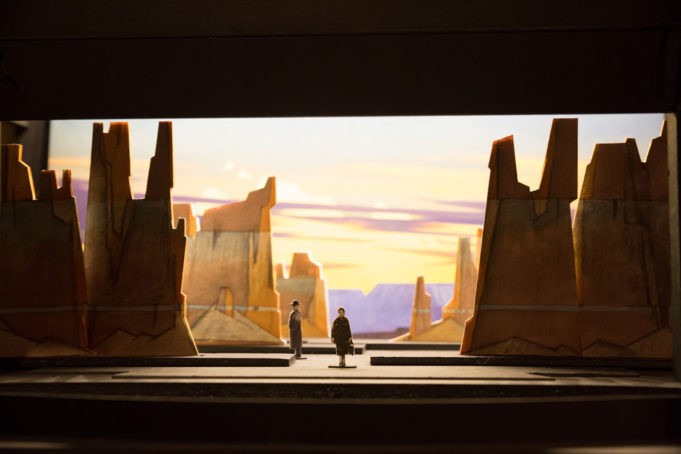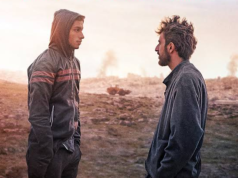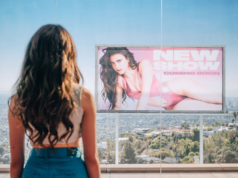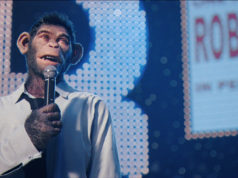As I’ve mentioned before, the Lone Star Film Festival went entirely online this past week, so I had the new experience of taking in a festival from home. I didn’t miss the scheduling conflicts and the hurried dinners taken between screenings, but I did miss the big-ticket items and the buzz of the crowds that tend to accompany those. We can only hope that those return to downtown Fort Worth in the near future.
One part of the festival that benefited from being online was the short films. Festival screenings of shorts tend to be sparsely attended, so you don’t lose much watching the movies by yourself, and if you find yourself at a loose end for five or 10 minutes between scanning the results of the presidential election, you can easily take one in. That’s how I came to Nolan Wilson Goff’s Bite the Hand, about a teenage mother who prepares to dispose of her recently deceased mother’s house, and while I found it lacking in point, it was a nice showcase for Plano native Liana Liberato as the main character. The same could be said for Noah Weisberg’s Thank You Kindly, which showcases the singing voice of Orange Is the New Black’s Kimiko Glenn as a clerk at a crappy motel in Southern California who yearns to act. This short subject is scored like a 1950s musical, continuously and with a full orchestra, which is a luxurious touch. As for the nonfiction shorts, Ben Masters (whose documentary feature The River and the Wall played in our theaters recently) contributes with American Ocelot, tracking the efforts to preserve the species in southeastern Texas. For someone like me who’s intrigued by the smaller big cat species, this was catnip.
Sometimes a short is good for just a joke, like with Colin Babcock and Corey Cook’s Dudes, which starts with a setup familiar to festivalgoers — a pretentious filmmaker at a festival holds a Q&A session for his film — only to turn unexpectedly into an impassioned defense of self-exploration followed by a great punchline. The Bragg brothers’ A Piece of Cake takes a silly concept and sees it through to a logical end, as a California dad (played by Mad Men’s Rich Sommer) has his little girl request silver dragées for her birthday cake. His attempt to find the cake decorations that are illegal in California becomes a daylong odyssey into a criminal underground dragée racket.
If you like your jokes creepy, Javier Chavanel’s Smiles has a Spanish man visiting his girlfriend’s family only to discover that they’re all mute and wearing rubber masks with smiley faces painted onto them. My favorite comic short was Charlie Fonville’s The Watchmaker, a mockumentary about a Japanese timepiece artisan (Hidetoshi Imura) addressing the camera as he prepares to finish nine months of work on a watch for the British royal family. The serious treatment devolves into farce, as the old man goes from uttering koans about his craft and the nature of time to dropping watch parts everywhere and losing his Zen calm.
I will admit to being somewhat underwhelmed by the dramatic features this year. Will Bakke’s The Get Together isn’t bad, but these sprawling Linklateresque comedies about hip young Austinites are starting to bleed together in my mind. David and Francisco Salazar’s Nowhere suffers from a rushed and haphazard ending as it tells the story of a gay Colombian couple in New York trying to stay in the country. Sevgi Hirschhäuser’s Toprak (the title refers to a specific type of dry soil) has some nice moments about a poor Turkish family trying to make their pomegranate farm profitable. If you’re interested in a throwback Spanish sex farce, Suso Imbernón and Juanjo Moscardó Rios’ Instant Love fits the bill nicely.
The strongest dramatic entry was Joshua Leonard’s Fully Realized Humans. He and co-star/co-writer Jess Weixler make an assured comedy team as expectant parents, and he engineers some great set pieces. The final scene, when they confront their own parents about the traumas inflicted on them, gives the film its emotional grounding.
Even so, I had better experiences with the documentary features. Kristin Atwell Ford’s Riders of the Purple Sage: The Making of a Western Opera goes behind the scenes at the 2017 world premiere of Craig Bohmler’s opera version of Zane Grey’s novel, and it would have been better in a movie theater, with the music of the opera filling the space around you. Andrés Sanz Vicente’s The Painting plays like Room 237, except it’s about one of the greatest paintings in existence, Diego Velázquez’ “Las Meninas.” Spanish, American, and British art scholars examine the painting from all angles while the filmmaker breaks up the “talking heads” approach with interludes in stop-motion and computer animation and draws a moving portrait of a painter and his royal patron, both near the end of their lives. David Neptune’s Words Can’t Go There profiles his father, John Kaizan Neptune, a rare Westerner who mastered the Japanese shakuhachi flute. The film takes a deep dive into a corner of music that you probably don’t know, showing how this Californian revolutionized the instrument and taught a new generation of players at the cost of his marriage. For all the frustrations of not experiencing these films in a festival environment, they were quite rewarding on the small screen.












